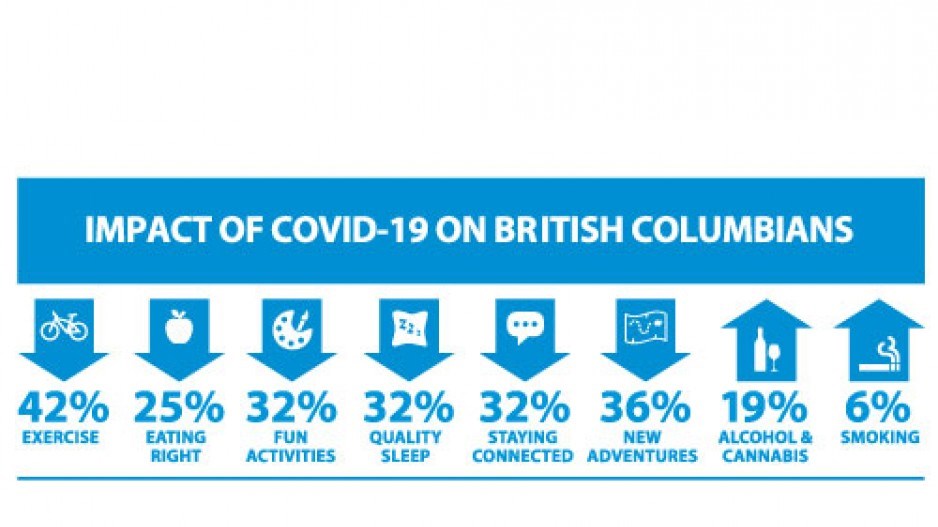Two new research studies commissioned by Pacific Blue Cross have painted a picture of how British Columbians are coping with their mental and physical health due to the prolonged COVID-19 pandemic.
What they’ve found points to an imminent threat of a “twindemic” in our province—both a COVID-19 and a mental health care crisis—as well as worrying trends in our physical self-care that could have significant impacts on the health care system in the coming years.
“The research presented a clear and consistent message about the importance of removing barriers to access for the care people need, as we hunker down to contain the virus—including augmenting services with virtual care options,” says Heidi Worthington, Senior VP at Pacific Blue Cross.
“With crisis comes opportunity, and we believe this is an excellent time to rethink care delivery in ways that meet today’s challenges while looking to tomorrow.”
COVID-19 has impacted mental health
In a survey by Pacific Blue Cross, which included 1,054 adults across B.C., 52 per cent admitted to having fair to poor mental health versus 19 per cent pre-COVID-19. One third of those participants expect their mental health to decline if the pandemic continues to worsen in the fall and winter.
And, while a significant number have experienced mental health challenges since the pandemic began, a majority of us haven’t engaged professional help.
Some of the barriers to access cited include affordability (60 per cent), insufficient coverage in their benefit plan (62 per cent), and lack of awareness of where to get help (50 per cent).
Physical health is also suffering
British Columbians reported exercising less often than usual (42 per cent), increased intake of unhealthy foods (25 per cent), getting poor quality sleep (32 per cent), and and inability to maintain connections to family and friends (32 per cent) since the pandemic hit. In addition, 19% are using more alcohol and cannabis—and six per cent are using more tobacco.
When asked about their use of health care services, 63 per cent said they typically use walk-in clinics or family doctors—but they’ve been visiting these services 34 per cent less frequently during the pandemic.
Only 27% of British Columbians have ever used a virtual care platform; however, there’s a heightened sense of the importance of virtual care in this COVID-19 era.
In a separate survey of Pacific Blue Cross plan members, 51 per cent said that virtual health is more important now than it was before the pandemic, 76 per cent said they’d be more likely to use a virtual service to see a GP or family doctor, and 33 per cent would be interested in adding virtual care to their benefits plan.
Virtual care is value-added care
The need to access care, especially while respecting physical distancing, presents an opening for employers to add a virtual care option as part of a comprehensive benefits plan.
By enabling employees to see a health care provider without leaving work, virtual care reduces absenteeism. It also helps employers attract and retain employees and improves employee satisfaction.
Virtual care is an excellent solution for employees who are unable to easily see a physician, say, if they live in communities that are remote or don’t have robust medical services or access to a family physician. It also helps in communities where line-ups are long at walk-in clinics, which most are trying to avoid joining during the pandemic.
Virtual health can also help reduce the use of hospital emergency rooms for after-hours non-acute medical care—saving money in our overall health care system.
It’s important to note that not all virtual care offerings are the same. Things to consider when looking for a virtual healthcare system include ease of access to doctors and what support is readily and always available through the platform
Pacific Blue Cross now offers EQ Care, Canada’s premiere virtual care provider, for secure, 24/7, on-demand access to doctors and other health care professionals. The service pairs patients with a care manager that coordinates the care experience—including follow-up tests, referrals to specialists or mental health professionals, and electronic prescriptions sent to the member’s preferred pharmacy for pick-up or home delivery.
Looking after staff is always good for business, and for those employers who are in a position to act, John Crawford, president and CEO of Pacific Blue Cross, has a message for you:
“As BC’s Health Benefits Society, we’re committed to improving access to health care for British Columbians. I’m encouraging all business leaders to recognize the pandemic’s impact on your employees, have a thoughtful strategy and adequate resources in place to get them through it, and do what you can to facilitate access to mental and physical health support in your communities.”
Benefits Advisors and Pacific Blue Cross account executives can help ensure benefits plans meet the needs of your staff during these unprecedented times.




